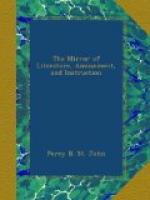Lord King has just done the state of literature some service, by the publication of the Life of John Locke: with Extracts from his Journals, &c. In this task his lordship has drawn largely on some valuable papers of Locke, preserved by their having gone into the possession of Sir Peter King, the ancestor of Lord King, his near relation and sole executor. Among these treasures are Locke’s correspondence, a journal of his travels in France and Holland, his common-place book, and many miscellaneous papers; all of which have been preserved in the same scrutoire in which they had been deposited by their author, and which was probably removed to Oakham, (Lord King’s seat,) in 1710. From the latter portion of Lord King’s valuable work, we select a few notes, illustrative of Manners and Customs in
ENGLAND, 1679.
The sports of England, which, perhaps, a curious stranger would be glad to see, are horse-racing, hawking, and hunting; bowling,—at Marebone and Putney he may see several persons of quality bowling, two or three times a week all the summer; wrestling, in Lincoln’s Inne Field every evening all the summer; bear and bull-baiting, and sometimes prizes, at the Bear-Garden; shooting in the long-bow and stob-ball, in Tothil Fields; cudgel-playing, in several places in the country; and hurling, in Cornwall. London.—See the East India House, and their magazines; the Custom House; the Thames, by water, from London Bridge to Deptford; and the King’s Yard at Deptford; the sawing-windmill; Tradescant’s garden and closet; Sir James Morland’s closet and water-works; the iron mills at Wandsworth, four miles above London, upon the Thames; or rather those in Sussex; Paradise by Hatton Garden; the glass-house at the Savoy, and at Vauxhall. Eat fish in Fish Street, especially lobsters, Colchester oysters, and a fresh cod’s head. The veal and beef are excellent good in London; the mutton better in several counties in England. A venison pasty and a chine of beef are good every where; and so are crammed capons and fat chickens. Railes and heathpolts, ruffs, and reeves, are excellent meat wherever they can be met with. Puddings of several sorts, and creams of several fashions, both excellent; but they are seldom to be found, at least in their perfection, at common eating-houses. Mango and saio are two sorts of sauces brought from the East Indies. Bermuda oranges and potatoes, both exceeding good in their kind. Chedder and Cheshire cheese. Men excellent in their arts. Mr. Cox, in Long Acre, for all sorts of dioptical glasses. Mr. Opheel, near the Savoy, for all sorts of machines. Mr. ——, for a new invention he has, and teaches to copy all sorts of pictures, plans, or to take prospects of places. The King’s gunsmith, at the Yard by Whitehall. Mr. Not, in the Pall Mall, for binding of books. The Fire-eater. At an iron-monger’s, near the May-pole, in the Strand, is to be found a great variety of iron instruments, and utensils of all kinds.




